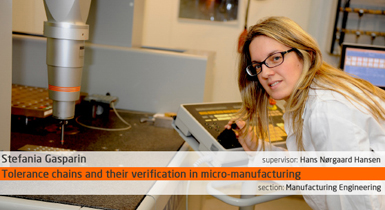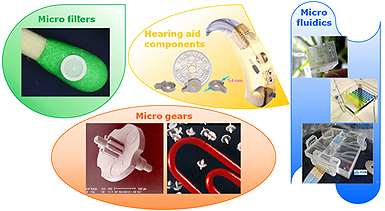
Background
In the traditional manufacturing environment, dimensional metrology is an integral part of all quality assurance systems, and the available tools in terms of instrumentation, calibration artefacts, standards and well established procedures support the increasing demands for production in global networks of highly complex components and products.
In the context of micro manufacturing, metrology has an extremely important role to play: the manufacturing paradigms taken primarily from the macroscopic world are applied to micro or even nano scaled components and functional features.
Many product concepts are based on assemblies of components, usually manufactured in different ways and locations as in macro scale manufacturing, see Figure 1. This concept requires detailed knowledge of not only absolute dimensions and geometrical quantities, but also about the uncertainty of measurement, because this is a decisive parameter when dealing with mating capability in general.

Figure1 Examples of micro components.
Tolerancing is linked closely together with metrology and it is seen like a bridge between the process chain and the product specification. The quality and the performance of a replicated micro-part depend on the quality and performance of the corresponding micro-mould. One basic requirement of micro-moulds for high throughput micro-replication processes is that the components of the mould (inserts) must be replaceable, so the repeatability of the inserts fabrication processes must be enough to produce inserts which satisfy the required geometric tolerance requirements to ensure parts of acceptable quality. A growing trend is the production of components and devices with functional micro features and sizes ranging from a few hundred microns to sub-micron, especially those with dimension below 20 µm, together with tolerances in the range of 1 to 10% of the nominal dimensions (in precision engineering < 0,01%) and surface roughness in the range of 10 to 50 nm. Therefore the available technologies appear not sufficient due to this scaling down of the critical dimensions and to an increase geometrical complexity of objects.
Objective
The main objective of the project is to develop a methodology for tolerancing of components and associated process chains in micro manufacturing with focus on the micro injection moulding process. A systematic approach will be applied based on dimensional and geometrical metrology as well as tooling process chain characteristics related to micro injection moulding, see Figure 2.

Figure 2 A: Nano-structured nickel stamper manufactured by electroforming. B: Nano-structured polycarbonate substrate produced by injection compression moulding. Scanning area: 15 x 15 µm2.
Categorization of tolerances and their use in micro manufacturing, product and component level as well as process capability level, will be investigated in order to develop a methodology and in order to establish tolerance chains for micro manufacturing. Moreover dimensional and geometrical metrology approaches will be carried out to support tolerance verification including calibration methods and measurement uncertainty estimation. A valuable output of the project will be a possible optimization of the component/product design, design guidelines for micro mechanical components based on model for tolerance chains.
PhD project team
Stefania Gasparin, PhD student, DTU Mechanical Engineering
Hans N. Hansen, Professor, main supervisor, DTU Mechanical Engineering
Guido Tosello, Associate professor, co-supervisor, DTU Mechanical Engineering
Leonardo De Chiffre, Professor, co-supervisor, DTU Mechanical Engineering